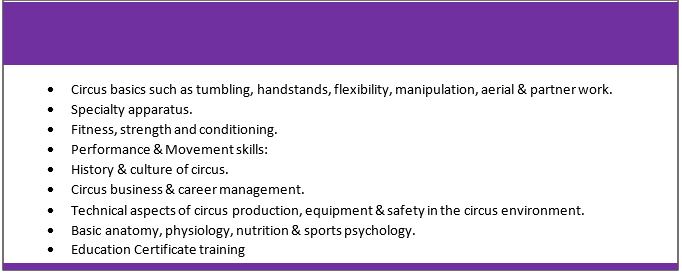Share This:
September 20, 2016 | Theatre,
What it Takes to be a Circus Star
This season we are thrilled to have the opportunity to present two major internationally acclaimed circus troupes. Audiences and press raved about our season opener, Cuisine and Confessions, proclaiming it to be “Heartbreaking, completely delirious and fun. It’s a must-see” And much newer circus troupe Machine De Cirque is taking the world by storm, charming audiences with their ravishing looks and extreme circus acrobatics. The New Haven Independent rates the production and quality of their performances to be “Brilliant. Boundary Shattering.” We welcome Machine De Cirque to our stages in just a few short weeks and with all the buzz they are bringing along with them, we are excited to have the troupe in our theatre.
We all sit in the audience and are amazed by the fancy acrobatic feats and stunts. We gasp and sit on the edge of our seats, whispering as the troupes take our breath away, making us feel slightly less sane. We squirm, and frantically cover our eyes with fear that the performers might miss a step or fall out of a routine, but with grace and elegance, they somehow beat all odds while sticking every landing. Ever wonder how they create this sense of effortless magic?
Before making it to the big top or landing on the professional stage, a circus performer trains almost every day for years developing strength, agility, and discipline while honing and refining their craft or specific specialty. For some, the training might start as early as in their youth and formative years, transitioning from art styles like dance or gymnastics or other engaging physical sport activities. But after those initial years of training what is the next step for a circus performer? How do they continue their training?
For some, the next step in progressive training goes from the circus mats to a classroom or institutional setting. That’s right, there are universities and institutions worldwide dedicated to furthering the skill level of a circus performer. In certain countries, at the age of 17 performers are encouraged to continue their studies and trainings at a circus focused institution where they can take their skills to the next level. The institutional approach allows Circus performers to solely concentrate on their training and specialty act, putting them on a fast track to the professional market.
But for others the road to the professional world is taken by a different route. Knowing how the business can be unpredictable and inconsistent, some performers take the educational approach, finding themselves in classrooms that expand strictly beyond circus performance. In these programs performers become students of the trade, learning the ins and outs of the circus business. It’s a recently formed major, called a Bachelor of Circus Arts, and for schools that don’t have a major specific name, it falls under their interdisciplinary studies program. Similar to the institutional curriculum, the educational programs include performance courses, but also incorporate academic courses from different departments throughout the university.
Below is typical course catalog for a degree tracked Bachelor of Circus Arts program:

Just like any other college, institution, or conservatory, there is an audition, application, and screening process. Applicants must meet specific admission requirements and have certain skill level and show potential for growth. Some institutions and schools go on nationwide tours to recruit candidates for their programs.
Here is a clip of what the audition process is like at the National Institute of Circus Arts through Swinburne University of Technology in Melbourne, Australia
The life of a circus performer is not easy. We mainly see the finished and polished product, not even thinking about the amount of practice and time it took to develop a production theme, on top of executing choreography and script. We are pumped to welcome the Quebec based Machine De Cirque, a little more educated on the process in which it takes to become a circus artist.
Get your tickets now! Machine De Cirque runs in the Emerson/Paramount Center Mainstage Theatre from September 21st – October 2nd. Don’t miss out!




Leave a Reply